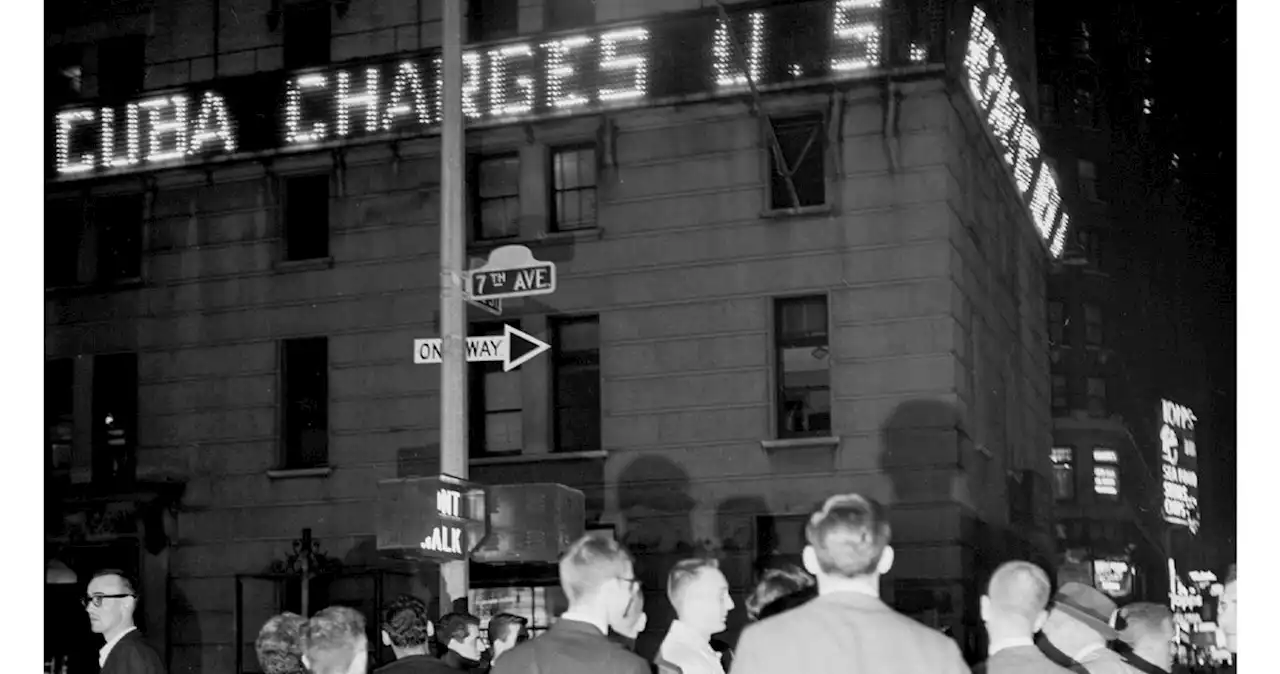'The editor asked the obvious question: How was this going to end? I said nobody knew, but if this was a first draft of history, it might also be the only one, if it even got on the presses. He did not find that funny.'
Manhattan pedestrians watch the Times Tower electric sign, flashing news of JFK’s speech announcing the blockade of Cuba.Manhattan pedestrians watch the Times Tower electric sign, flashing news of JFK’s speech announcing the blockade of Cuba.Manhattan pedestrians watch the Times Tower electric sign, flashing news of JFK’s speech announcing the blockade of Cuba.
If the fatal red button were pressed, that would happen in either Washington or Moscow. It is said that journalists write the first draft of history. In this case, it felt like a very thin first draft. We knew little of what was really going on behind the theatrics. By chance, at the U.N. I met, among the American reporters, one who seemed to be a Washington insider.
Beyond the visitors at the Roosevelt Hotel, New Yorkers were more aware that they could be living at ground zero. That morning, the New Yorkran a piece titled “Where to Go If Nuclear War Comes.” Basically, it led to buildings that displayed the yellow-and-black symbol for a, a black circle with three inverted triangles inside it. They were a Cold War feature, and there were hundreds of them in New York, mostly in the basements of offices and apartment buildings.
Nonetheless, state governors had been called to the White House to step up preparations for civil defense, and radio and TV stations tested their five-minute warning of imminent attacks. I remember one satirist of media mindlessness impersonating a TV anchor signing off withMy deadline was midnight on Sunday, October 29. I was writing the magazine’s cover story. There was as yet no lede. I had to dictate my copy over the phone to an editor in London.
That perception changed after Kennedy announced his blockade of Cuba. In my first report, I wrote that his blockade speech transformed his reputation overnight: “He ceased to be President and became Commander-in-Chief … smears of yellow-bellied leadership died in mid-utterance. In the gathering darkness, Kennedy recaptured the idolatry of his inauguration day — ironically, no longer as the leader of a new-age liberal rule, but as the gladiator entering the ring.
News of the deal was released soon afterward. Kennedy called the three living previous presidents, Herbert Hoover, Harry Truman, and Eisenhower. Ike asked if Khruschev had set any conditions. “No,” replied Kennedy, “except that we’re not going to invade Cuba.” Truman never asked any questions. Hoover said it was “a good triumph for you.”
